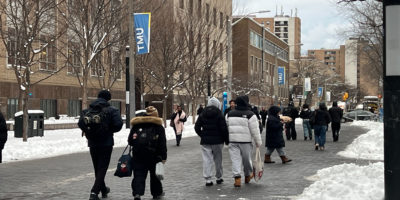By Mina Alam
As a committee is being established to select a Dean for Ryerson University’s new Faculty of Law, the big question remaining is where the money to fund the law school will come from.
Despite the law school having already been approved by the Quality Assurance Council, as well as the Federation of Law Societies of Canada and the Law Society of Ontario (LSO), the Ontario government rejected Ryerson’s proposal for the law school in November.
This means students attending will not be eligible for the Ontario Student Assistance Program (OSAP).
However, president Mohamed Lachemi said the law school would continue without funding from the government.
Currently, the Faculty of Law is expected to open with a class of 150 students in the fall 2020 semester. Though in the future the university hopes to give Faculty of Law its own space, as of now it will occupy the fourth floor of the POD, currently used by the Faculty of Community Services.
“A lot of people were waiting to see if the government would announce their decision and whether Ryerson was really going forward with it,” said Ryerson provost and vice-president, academic Michael Bennaroch.
“I think that individuals, lawyers and others who believe in kind of the vision that we want to create for this law school will be interested in supporting and ensuring that it will be successful.”
Students attending will not be eligible for the Ontario Student Assistance Program
Money can come from private funding, though Phil Cyrenne, a professor of economics at of the University of Winnipeg, warned that private funding “is more rare because there’s no name attached to it.”
However, Benarroch said he is confident in the funding that could come from private sources. The school has already received a private donation, with more expected to come.
Private donors may also have another incentive in the form of charitable tax receipts, according to Dan Lang, professor emeritus at the University of Toronto and an expert in education economics.
In addition, he said the government might be asked to match particularly large gifts.
“I think most donors who would have enough to be wealthy enough to make that kind of gift, they would be pretty savvy about this,” he said. “They would understand that there’d be…a bit of leverage with government, the bigger the gift.”
It’s possible for public universities in Ontario to offer a private or “self-funded” program, added Lang.
The Faculty of Law is expected to open with a class of 150 students in the fall 2020 semester
“I’d say that they no longer fall under the heading of ‘exotica.’ Quite a few universities now have this type of program and they’ve had them for some time,” Lang said.
In 2016, the Financial Accountability Office of Ontario released a report outlining its contributions in the funding of post-secondary institutions. As of 2014, 33 per cent of the total revenue schools receive has come directly from the Ontario government, and 28 per cent from tuition and fees paid by students. This means a total of 39 per cent comes from other sources.
“It’s worth noting though that law is one of the least well-funded of the professional programs,” Lang said. “[This] means the amount of public funding that Ryerson would forego is not that great. But that also means that pretty much it’s got to be made up mainly from tuition fee.”
Cyrenne also pointed towards money given by the government on a per pupil basis. According to Benarroch, this amount was estimated to be “somewhere between six and seven thousand dollars per student.”
While tuition for the Faculty of Law school was originally projected to be around $20,000, without the government’s assistance, students will be looking at tuition closer to $26,000. To offset these costs, money being raised will also go towards scholarships.
Benarroch said the goal is to have 30-50 students whose tuition is “highly subsidized” through scholarships.
He added research grants could help cover some costs, although this would likely be more for upper-year students than students in their first year of the program.
“While right now may not be the right time for government, our hope is that over time we’ll find an important place in the Ontario economy,” Benarroch said.
“You never know—maybe one day in the future, the government will say: the way that this school has evolved and the kind of impact you’re having is something that we wanna be involved in, and will come forward and support the program.”












Pithambaran
I don’t know why people feel that Ontario has more than enough law schools and lawyers. If there are no opportunities in Ontario, there are so many opportunities in other parts of Canada. Canadian legal education being one of the best is the world, Canadian lawyers will migrate to places where the market is attractive. Trinity Western lost a golden opportunity and by the time Memorial opens its doors, it would loose its edge. The decision makers at Ryerson need a round of applause as they have truly understood the nature of the legal market.
kwok pun chan
Now zero funding , can only go up?
https://www.cbc.ca/news/canada/toronto/ontario-colleges-university-performance-funding-budget-1.5094751
kwok pun chan
IPC training @ community legal clinic : win/win
https://www.thelawyersdaily.ca/business/articles/11880